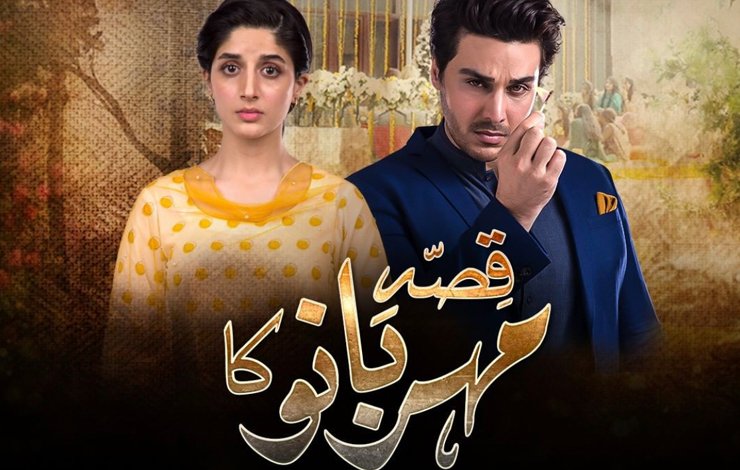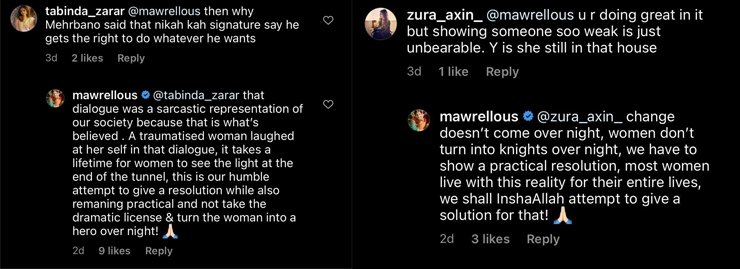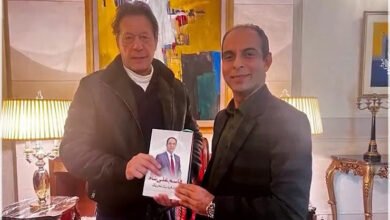Qissa Meherbano Ka draws criticism over display of marital rape
Qissa Meherbano Ka starring Ahsan Khan and Mawra Hocane and Zaviyar Ejaz has drawn criticism over depicting marital rape.

Hum TV’s drama Qissa Meherbano Ka starring Ahsan Khan and Mawra Hocane and Zaviyar Ejaz has drawn criticism over depicting marital rape.
Qissa Meherbano Ka is highlighting the serious issues of family separation, single-parenting, inheritance and abusive relationship between Meherbano (Mawra Hocane) and Murad (Ahsan Khan).
The display of marital rape has grabbed everyone’s attention that war aired in the last three minutes of the drama’s 15th episode and later in the 16th episode, Meherbano justified the marital rape by calling it Murad’s right to be with her.
View this post on Instagram
A user wrote, “Today episode of HumTV drama: husband violently raping his PREGNANT wife and everyone‘s okay with it.”
Today episode of HumTV drama: husband violently raping his PREGNANT wife and everyone‘s okay with it.
….
— Cocomo (@tussimenukeyasi) December 18, 2021
A user criticised Pemra authorities, saying, “Were you unconscious or knocked out when you passed that drama called “qissa meherbano ka” shame on you for repeatedly showing marital rape!! It’s almost looks like an attempt to normalise this disgusting behaviour!! Shame on you !!!”
@reportpemra were you unconscious or knocked out when you passed that drama called “qissa meherbano ka” shame on you for repeatedly showing marital rape!! It’s almost looks like an attempt to normalise this disgusting behaviour!! Shame on you !!!
— javeria (@jikhlaq52) December 20, 2021
A netizen tweeted that there is absolutely nothing wrong in illustrating an evil within aesthetic limits that don’t sensationalise the behaviour. She added that Murad is an evil, not a hero.
TRIGGER WARNING:Rape/ sexual violence Same argument during #Uddari There is Absolutely nothing wrong in illustrating an Evil within aesthetic limits that dont Sensationalise the behavior This is Marital Rape & part of the story Murad is Evil not a hero #Qissameherbanoka
— Sadaf Haider صدف حیدر (@tomtomatoe) December 11, 2021
Responding to the criticism, Mawra Hocane wrote, “Marital rape is defined as the forceful act of consummation by the husband with his wife without her explicit approval.”
It is #maritalrape when :
“Marital rape is defined as the forceful act of consummation by the husband with his wife without her explicit approval.”#QissaMeherBanoka https://t.co/AVYzLWsb2P
— MAWRA HOCANE (Hussain) (@MawraHocane) December 13, 2021
In an Instagram post, Hocane clarified her stance, saying that the dialogue was a sarcastic representation of our society because this is what’s believed.
“A traumatised woman laughed at herself in that dialogue, it takes a lifetime for women to see the light at the end of the tunnel, this is our humble attempt to give a resolution while also remaining practical and not take the dramatic license & turn the woman into a hero overnight!”
In another reply to a comment, she wrote, “Change doesn’t come overnight, women don’t turn into knights overnight, we have to show a practical resolution, most women live with this reality for their entire lives, we shall InshaAllah attempt to give a solution for that!”
The lead actor Ahsan Khan told Images that the drama hasn’t explicitly shown marital rape, it has “highlighted it without sensationalising it”. “The depiction has been very subtle,” he said.
“Iqbal Hussain and Momina Duraid made the drama in such a sensitive way that the direction did all the telling without us having to show much as actors. They directed in a very positive way, without sensationalising the issue,” he added.
“Personally speaking, I don’t see any redemption arc [for Murad in the drama],” said Khan. “He’s such a bad guy. In our society, we keep on waiting for justice against individuals who are so unfair and need to be punished but it doesn’t happen.”
“While I personally feel this character should be punished for his actions, I can’t give away the highlights of the story because of where it is going. In time, viewers will understand why we showed certain things the way we did and what the consequences from that were.”




